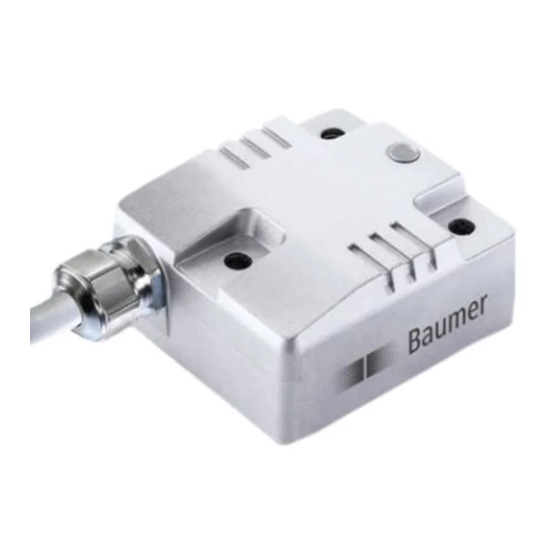Baumer GIM500R Manuel - Page 5
Parcourez en ligne ou téléchargez le pdf Manuel pour {nom_de_la_catégorie} Baumer GIM500R. Baumer GIM500R 20 pages. Inclination sensors
Également pour Baumer GIM500R : Manuel (29 pages), Manuel (13 pages), Instructions de montage (2 pages)

3
Analog interface communication
3.1 Analog interface properties
• Supply voltage 8...36 VDC
• Sensor is protected against reverse polarity and short circuiting.
• Initialization time after power on ≤ 0.5 s
• Operating current with no load is inferior to 40 mA, at 24 VDC
• Several analog signal outputs 4...20 mA / 0.5...4.5 V / 0...5 V / 0...10 V
• Load resistance ≥1 kΩ / voltage output resp. ≤800 Ω / current output
• Different sensing ranges, 1 and 2 dimensional
• Resolution 12 bit
• Temperature coefficient 0.008 °/K
• Precision: (+25 °C) typical ±0.1°
• Scanning frequency 1600 Hz
• Limit frequency 0.1...25 Hz, 2nd order / deep-pass filter (default: 5 Hz)
• Programmable parameters: preset and offset value resp. filter
• Diagnostic function to identify parameterization errors
3.2 Installation position
The mounting position is of critical importance for the measured signal values. Depending on the mounting
position of the inclination sensor and the movement in the application, the analog signal values will increase
or decrease.
Installation position 1-dimensional
3.2.1
When installing the 1-dimensional inclination sensor, observe the rotation axis shown below is directed in
perpendicular position towards gravity. The maximum misalignment of ±3° must not be exceeded.
The sensor default position is 0° as shown in the illustration below but may be configured at will in a 2-point
teaching or zeroing operation.
Baumer_GIM500R_Analog_MA_EN.docx
11.04.18
5/20
Baumer IVO GmbH & Co. KG
Villingen-Schwenningen, Germany
